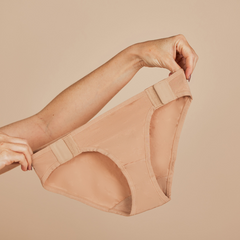Is nerve pain relief possible, and what are some of our top tips to help you better manage associated discomfort?
Nerve pain, also known as neuropathic pain, can be a real challenge for those who experience it. The discomfort, sensitivity, and limitations it brings can significantly impact daily life and change how everyday activities need to be done.
As with any discomfort, it’s perfectly natural to want to find ways to alleviate nerve pain, and exploring effective home remedies and adaptations is extremely common for those seeking nerve pain relief.
Nerve pain can arise from various causes, such as injuries, medical conditions, or nerve damage. Traditional medical treatments certainly play a vital role in managing this condition, but many seek additional comfort and relief within the familiar confines of their home. We’re going to look at a more holistic approach to nerve pain relief, encompassing lifestyle adjustments, natural remedies, and the strategic use of adaptive tools.
Ultimately, it is up to you and your clinician to decide on the best course of action for your situation.
Our Top Tips For Nerve Pain Relief

Living with nerve pain can be challenging, but there are a number of effective strategies and tips that can help as you try to alleviate everyday discomfort and improve your quality of life.
Embrace Adaptive Solutions
One of the most powerful ways to find relief from nerve pain is by incorporating adaptive solutions into your daily life. Simple adaptive tools and small changes, like adaptive bras and reachers, are specially designed to reduce strain and make everyday tasks more manageable. Adaptive clothing, with easy fastenings and comfortable fabrics, can make dressing more comfortable and can help to alleviate some of the discomfort caused by difficult straps or clasps.
Take a look at our favorite adaptive tools for nerve pain relief below.
Consider Alternative Therapies
Alternative therapies, such as acupuncture or chiropractic care, may complement traditional treatments and provide additional relief from nerve pain. Consult with healthcare professionals to explore which therapies might be suitable for your specific condition and they may be able to suggest some treatments to try.
Prioritize Proper Posture
Maintaining proper posture is essential for nerve pain relief, especially if you’re looking to relieve nerve pain in the back and neck. You could try to invest in ergonomic chairs and lumbar support cushions to promote spine alignment and reduce strain. By prioritizing good posture, you can significantly ease tension and discomfort in problem areas.
Stay Active with Gentle Exercises
Engaging in low-impact exercises, such as walking or swimming, can help increase blood flow to the affected nerves, promoting healing and providing natural pain relief. Gentle exercises also release endorphins, which can positively impact your mood and overall well-being.
Try to avoid rigorous exercise that puts added pressure on areas in which you commonly find discomfort.
Utilize Hot and Cold Therapy
Hot and cold therapy is a tried-and-true method for managing nerve pain. Applying a heating pad or warm compress relaxes tense muscles and improves blood circulation, while using a cold pack can numb the area and reduce inflammation.
Mindfulness and Stress Management
It is quite commonly suggested that stress can worsen nerve pain, so incorporating mindfulness practices and stress management techniques can be beneficial. Try your hand at meditation, deep breathing exercises, or yoga to reduce stress levels and enhance your body's ability to cope with pain.
Adaptive Solutions For Nerve Pain

Adaptive solutions are all about avoiding discomfort and strains that can aggravate injuries. They can take many forms around the home and they aim to reduce the chances of injury caused by overworking joints and muscles that can lead to pain.
Adaptive Bras for Nerve Pain
Adaptive bras are an essential adaptive solution, and they’re one we always recommend for those with mobility or pain problems. Most adaptive bras will have front closures or easy-fastening mechanisms to eliminate the need for twisting or stretching arms to clasp the bra. This significantly reduces strain and discomfort, and is invaluable for maintaining independence and reducing pain.
Shop adaptive bras for nerve pain.
Reachers
Reachers are invaluable tools for individuals with nerve pain that can help them to access items beyond arm's reach without overstretching. These tools promote independence and reduce the risk of injury during everyday tasks.
Adaptive Clothing
Beyond bras, adaptive clothing, designed with easy fastenings and stretchy fabrics, offers a simplified dressing experience for those dealing with nerve pain. Front-closure shirts and elastic-waist pants simplify dressing, providing comfort and relief.
Ergonomic Chairs
Ergonomic chairs with lumbar support are an excellent choice for individuals experiencing nerve pain in the back. By promoting proper spine alignment, these chairs reduce pressure on nerves and contribute to improved posture.
Grab Bars and Handrails
Installing grab bars and handrails in bathrooms and stairways can provide additional support and stability, especially for those with nerve pain that impacts balance or mobility.
Nerve Pain Home Remedies

Along with adaptive clothing and household tools, there are a number of nerve pain home remedies that you can try.
Essential Oils or CBD
Essential oils like lavender, peppermint, and chamomile possess natural anti-inflammatory properties. Applying diluted essential oils can soothe nerve pain and promote relaxation. Many people also claim that CBD helps them relax and can reduce some of their pain.
Mindfulness and Meditation
Pain relief for nerve damage isn’t always about medication, it can be about reducing pain triggers. Practicing mindfulness and meditation can help reduce stress levels, which can worsen nerve pain. Engage in calming practices to manage stress and improve your overall well-being.
Gentle Exercises to Improve Blood Flow
Nerve pain relief at home can require some work. Gentle exercises, such as walking, swimming and stretching, increase blood flow to the affected nerves, promoting healing and natural pain relief.
Better Quality Sleep
Prioritize quality sleep by creating a relaxing bedtime routine and ensuring a comfortable sleep environment. Restorative sleep supports your body's healing process. During restorative sleep, the body works to repair tissue, build bone and muscle, strengthen the immune system, and regulate hormones.
To achieve restorative sleep, it's essential to prioritize both the quantity and quality of sleep. Adults typically require 7-9 hours of sleep per night, though individual needs may vary. Creating a good sleep environment, maintaining a consistent sleep schedule, and practicing relaxation techniques can contribute to achieving restorative sleep and experiencing its numerous health benefits.



